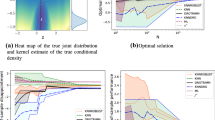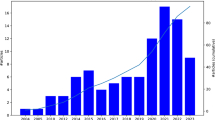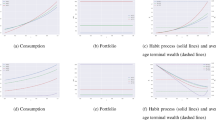Abstract
We formulate and study the infinite-dimensional linear programming problem associated with the deterministic long-run average cost control problem. Along with its dual, it allows one to characterize the optimal value of this control problem. The novelty of our approach is that we focus on the general case wherein the optimal value may depend on the initial condition of the system.
Similar content being viewed by others
Notes
In (23) and everywhere in the paper, \(\limsup _{T\rightarrow \infty }\Gamma _T(y_0)\) and \(\limsup _{\lambda \rightarrow 0}\Theta ^{\lambda }(y_0)\) are understood in the Kuratowski sense. Namely, \(\gamma \in \limsup _{T\rightarrow \infty }\Gamma _T(y_0)\) if and only if there exist sequences, \( \ T_l>0, \ \gamma _l\in \Gamma _{T_l}(y_0),\ l=1,2,\ldots , \) such that \(T_l\rightarrow \infty \) and \( \gamma _l\rightarrow \gamma . \) Similarly, \(\gamma \in \limsup _{\lambda \rightarrow 0}\Theta ^{\lambda }(y_0)\) if and only if there exist sequences, \( \ \lambda _l>0, \ \gamma _l\in \Theta ^{\lambda _l}(y_0),\ l=1,2,\ldots , \) such that \(\lambda _l\rightarrow 0 \) and \(\gamma _l\rightarrow \gamma . \)
Note that \(\Omega (y_0)\ne \emptyset \) if \(\Gamma _\mathrm{per}\ne \emptyset \); see Proposition 3.2.
References
Bhatt, A.G., Borkar, V.S.: Occupation measures for controlled Markov processes: characterization and optimality. Ann. Probab. 24(3), 1531–1562 (1996)
Buckdahn, R., Goreac, D., Quincampoix, M.: Stochastic optimal control and linear programming approach. Appl. Math. Optim. 63(2), 257–276 (2011)
Fleming, W.H., Vermes, D.: Convex duality approach to the optimal control of diffusions. SIAM J. Control Optim. 27(5), 1136–1155 (1989)
Stockbridge, R.H.: Time-average control of a martingale problem: a linear programming formulation. Ann. Probab. 18, 206–217 (1990)
Borkar, V.S.: A convex analytic approach to Markov decision processes. Probab. Theory Relat. Fields 78, 583–602 (1988)
Hernandez-Lerma, O., Lasserre, J.B.: The linear programming approach. In: Feinberg, E.A., Shwartz, A. (eds.) Handbook of Markov Decision Processes: Methods and Applications, pp. 377–407. Kluwer, New York (2002)
Hordijk, A., Kallenberg, L.C.M.: Linear programming and Markov decision chains. Manag. Sci. 25(4), 352–362 (1979)
Hordijk, A., Kallenberg, L.C.M.: Constrained undiscounted stochastic dynamic programming. Math. Oper. Res. 9(2), 276–289 (1984)
Klabjan, D., Adelman, D.: An infinite-dimensional linear programming algorithm for deterministic semi-Markov decision processes on Borel spaces. Math. Oper. Res. 32(3), 528–550 (2007)
Goreac, D., Serea, O.-S.: Linearization techniques for \(L^{\infty }\)—control problems and dynamic programming principles in classical and \(L^{\infty }\) control problems. ESAIM Control Optim. Calc. Var. 18(3), 836–855 (2012)
Hernandez-Hernandez, D., Hernandez-Lerma, O., Taksar, M.: The linear programming approach to deterministic optimal control problems. Appl. Math. 24(1), 17–33 (1996)
Lasserre, J.B., Henrion, D., Prieur, C., Trélat, E.: Nonlinear optimal control via occupation measures and LMI-relaxations. SIAM J. Control Optim. 47, 1643–1666 (2008)
Vinter, R.: Convex duality and nonlinear optimal control. SIAM J. Control Optim. 31(2), 518–538 (1993)
Finlay, L., Gaitsgory, V., Lebedev, I.: Duality in linear programming problems related to long run average problems of optimal control. SIAM J. Control Optim. 47(4), 1667–1700 (2008)
Gaitsgory, V.: On representation of the limit occupational measures set of a control systems with applications to singularly perturbed control systems. SIAM J. Optim. 43(1), 325–340 (2004)
Gaitsgory, V., Quincampoix, M.: Linear programming approach to deterministic infinite horizon optimal control problems with discounting. SIAM J. Control Optim. 48(4), 2480–2512 (2009)
Gaitsgory, V., Quincampoix, M.: On sets of occupational measures generated by a deterministic control system on an infinite time horizon. Nonlinear Anal. Ser. A Theory Methods Appl. 88, 27–41 (2013)
Gaitsgory, V., Rossomakhine, S.: On near optimal control of systems with slow observables. SIAM J. Control Optim. 55(3), 1398–1428 (2017)
Quincampoix, M., Serea, O.: The problem of optimal control with reflection studied through a linear optimization problem stated on occupational measures. Nonlinear Anal. 72(6), 2803–2815 (2010)
Bardi, M., Capuzzo-Dolcetta, I.: Optimal Control and Viscosity Solutions of Hamilton–Jacobi–Bellman Equations. Birkhauser, Boston (1997)
Carlson, D.A., Haurie, A.B., Leizarowicz, A.: Infinite Horizon Optimal Control. Deterministic and Stochastic Processes. Springer, Berlin (1991)
Zaslavski, A.: Stability of the Turnpike Phenomenon in Discrete-Time Optimal Control Problems. Springer, New York (2014)
Zaslavski, A.: Turnpike Phenomenon and Infinite Horizon Optimal Control. Springer, New York (2014)
Arapostathis, A., Borkar, V.S., Ghosh, M.K.: Ergodic Control of Diffusion Processes. Cambridge University Press, Cambridge (2012)
Borkar, V.S., Gaitsgory, V.: Singular perturbation in ergodic control of diffusion. SIAM J. Control Optim. 46(5), 1562–1577 (2007)
Kurtz, T.G., Stockbridge, R.H.: Existence of Markov controls and characterization of optimal Markov controls. SIAM J. Control Optim. 36(2), 609–653 (1998)
Rubio, J.E.: Control and Optimization. The Linear Treatment of Nonlinear Problems. Manchester University Press, Manchester (1986)
Arisawa, M.: Ergodic problem for the Hamilton–Jacobi–Bellman Equation. I. Existence of the ergodic attractor. Ann. Inst. Henri Poincare, Analyse Non Lineaire 14(4), 415–438 (1997)
Arisawa, M.: Ergodic problem for the Hamilton–Jacobi–Bellman equation. II. Existence of the ergodic attractor. Ann. Inst. Henri Poincare, Analyse Non Lineaire 15(1), 1–24 (1998)
Arisawa, M., Lions, P.-L.: On ergodic stochastic control. Commun. Partial Differ. Equ. 23(11), 2187–2217 (1998)
Grüne, L.: Asymptotic controllability and exponential stabilization of nonlinear control systems at singular points. SIAM J. Control Optim. 36(5), 1495–1503 (1998)
Grüne, L.: On the relation between discounted and average optimal value functions. J. Differ. Equ. 148, 65–69 (1998)
Lehrer, E., Sorin, S.: A uniform Tauberian theorem in dynamic programming. Math. Oper. Res. 17(2), 303–307 (1992)
M, Oliu-Barton, Vigeral, G.: A uniform Tauberian theorem in optimal control. In: Cardaliaguet, P., Grossman, R. (eds.) Annals of International Society of Dynamic Games, vol. 12, pp. 199–215. Birkhauser/Springer, New York (2013)
Quincampoix, M., Renault, J.: On existence of a limit value in some non-expansive optimal control problems. SIAM J. Control Optim. 49(5), 2118–2132 (2012)
Buckdahn, R., Quincampoix, M., Renault, J.: On representation formulas for long run averaging optimal control problem. J. Differ. Equ. 259(11), 5554–5581 (2015)
Anderson, E.J.: A review of duality theory for linear programming over topological vector spaces. J. Math. Anal. Appl. 97(2), 380–392 (1983)
Anderson, E.J., Nash, P.: Linear Programming in Infinite-Dimensional Spaces. Wiley, Chichester (1987)
Aubin, J.-P.: Viability Theory. Birkhauser, Basel (1991)
Ash, R.: Measure, Integration and Functional Analysis. Academic Press, Cambridge (1972)
Evans, L.G., Gariepy, R.F.: Measure Theory and Fine Properties of Functions. CRC Press, Boca Raton (1992)
Czarnecki, M.-O., Rifford, L.: Approximation and regularization of Lipschitz functions: convergence of the gradients. Trans. Am. Math. Soc. 358, 4467–4520 (2006)
Acknowledgements
The work on this paper was initiated, while V.S. Borkar was visiting the Department of Mathematics at Macquarie University. The research was supported in part by a J. C. Bose Fellowship from the Government of India and in part by the Australian Research Council Discovery Grant DP150100618.
Author information
Authors and Affiliations
Corresponding author
Additional information
Communicated by Lars Grüne.
Rights and permissions
About this article
Cite this article
Borkar, V.S., Gaitsgory, V. Linear Programming Formulation of Long-Run Average Optimal Control Problem. J Optim Theory Appl 181, 101–125 (2019). https://doi.org/10.1007/s10957-018-1432-0
Received:
Accepted:
Published:
Issue Date:
DOI: https://doi.org/10.1007/s10957-018-1432-0




